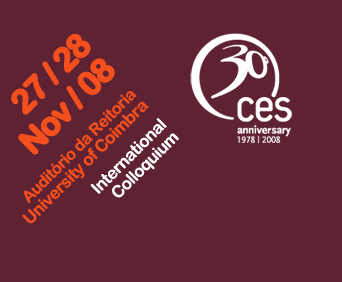Session abstracts
Session I – The rights to the sustainability of the ways of life and ethics: the North-South relations
This session deals with the relationship between human rights and development in the context of North-South relations. It analyses the theoretical underpinnings and practical consequences of the dominant liberal and universal understanding of human rights which structures contemporary development policies. Unpacking liberal and universal rights discourse implies discussing their relationship to possible forms of exclusion.
Thus, this session explores how the political and economic freedoms that have been the objective of almost two decades of liberal reforms remain disassociated from the experience of social and economic inequalities that characterize the everyday life of the vast majority. Three themes are of specific relevance: the first examines the predominance of authoritarian democracies involving the strategic appropriation of trans-national institutional designs, discourses and resources by local elites; the second concerns the effects of the neo-liberal interpretation of human rights and sustained development on local moral economies; the third brings together the reflection on local-transnational connections, ethics and rights by focussing on initiatives towards the realization of social, political and economic inclusion.
Session II – The “new” fundamental rights to the city and to health
The new millennium began with half of humanity living in cities, complex human artifacts that concentrate both opportunities and great inequalities. At the same time, despite the frequent proclamation of social rights as fundamental rights and the increasing capacity to prevent and treat some of the problems that affect the world population, there have been increasing inequalities regarding the conditions for access to health, dignifying housing, and education, among other forms of inequalities.
In this context, law in the XXI century faces the major challenge of affirming, consolidating and enforcing the “new” fundamental rights to the city and health. These “new” rights have increasingly become the object of heated debates and political-juridical battles. This session will examine these debates and battles critically, centering on two major areas: the first relates to the right to land for the purpose of housing; the second concerns the struggle for the recognition of the right to health.
Session III – The right to labor with rights
The current labor agenda shows the contradictory signs of a world subject to deep transformations. The vulnerabilities of the labor markets are clear in the diagnoses that indicate the trends of precariousness, a-typicality, discrimination, and social exclusion as structural problems in the world of labor. On the other hand, there are a growing number of initiatives aimed at reforming the systems of labor law which reinforce the need for adjusting labor norms to the objectives of economic competitiveness and adaptability.
Two debates have demonstrated the existing bifurcation between the defenders of the establishment of better conditions of effectiveness of labor rights and the defenders of the balancing of situations of flexibility within a framework of security for workers. The ILO notion of a dignifying work and the EU notion of flexi-security comprise the terms of the labor agenda.
The objectives of this session are to uncover the factors and obstacles for the production of a dignifying labor paradigm and the impacts of flexi-security in the various segments of the labor market. In this perspective, the session addresses in a critical manner the current challenges facing labor rights as human rights. Is it still possible to think of labor on the basis of labor with rights? Is it possible to expand the traditional conception of the right to labor to include an ample and integrated conception of social rights?
Session IV – Human rights and new paradigms of (inter)national security/violence
There is an apparent bifurcation in the current relationship between international security and human rights. On the one hand, the reconfiguration of the international agenda in the so-called framework of the “war against terrorism” legitimated the adoption of security and constituted one of the major priorities of governmental action. This new context is having multiple consequences. The various restrictions, surveillance, and norms of exception are today part of the laws established by States and drastically affect the individual liberties, democracy, and the rule of law. Guantánamo and the system of global sub-contracting for torturing are just some of the most publicized examples of this new era, representing an unthinkable space for the primacy of law, human rights, and democracy.
On the other hand, there have been conceptual and political steps toward the creation of a new framework and a new agenda of international security. The notion of human security attempts to create a broader vision of security (“freedom from want” and not simply “freedom from fear”) and a more emancipatory one, able to spark respect for all human rights. It is in this crossroad that the current debate on the relationship between (inter)national security/violence and human rights is situated. This crossroad, which will be the major focus of this session, is also a political and epistemological debate of primary importance.
Session V – Violence against women and human rights
The international recognition of women’s rights as part of the human rights framework is very recent and has been the result of feminist “women’s human rights” mobilizations at the international, regional, national, and local levels. The major focus of these mobilizations has been on the right of women to be free from violence in both private and public spheres. However, both the assumptions of this framework and the implementation of international norms present some challenges for securing the right of all women to live free from violence.
This session intends to address three of these challenges. The first concerns the forms of violence privileged in both feminist and human rights discourses on violence against women. Do they rely only on a gender-based analysis and do not take into account other factors and social structures shaping women’s experience of violence? The second challenge concerns the separation and the connections between the spaces and the scales in which violence against women take place. By de-centering both “gender” and “domestic violence,” the separation between private and public forms of violence, local and transnational relations of violence are put into question. Finally, the legal and cultural translation, adoption and implementation of international and regional human rights norms at different sectors of societies and States remain an ongoing struggle for women and other social groups subject to human rights abuses.
Session VI – Children’s rights: challenges to human rights
In the last two decades, especially after the establishment of the Universal Convention on the Rights of Children in 1989, the defense and consolidation of the rights of children assumed a special role at both international, national, and local scales. The promotion and realization of these rights brought special challenges to the State regarding the organization of the social protection of the family and of children, as well as the definition of a new public and private regulation of the family.
The same challenges are faced by the communities and their non-governmental organizations in their attempts to defend the rights of children against slavery, racism, xenophobia or any other form of discrimination. Equally challenging are situations of battery, sexual abuse, school withdrawal, or any other form of negligence on the part of the family, the society, or the State.
Session VII - Racism, discrimination, and the right to cultural diversity
Contemporary societies continue to be marked by deep cultural inequalities. Often these inequalities are still justified on the basis of biological arguments. This session intends to discuss this issue in relation to rights, exploring the processes through which difference is translated into inequality. Thus, the session will examine the persistence of various configurations of racism and other forms of discrimination, their denial, and the possibilities for overcoming them.
The emphasis will be on the articulation of the primacy of law, at the national level, and the limitations and possible alternatives for the reconfiguration of different legal moments that reflect different social conditions. Far from uncritically accepting the different situations of legal pluralism, this session will attempt to articulate perspectives from the global North and South in order to evaluate and make visible emancipatory experiences that mobilize various socio-legal practices.
Session VIII – Legal pluralism and human rights: dialogues among different conceptions of justice
In contemporary societies, human rights — framed from either a political, theoretical, discursive, rhetorical or legal perspective — are often invoked to promote individual and collective rights. But the meaning of the discourses on human rights is not uniform; on the contrary, it varies historically and reflects the local socio-cultural conditions in which such meaning is constructed. This session intends to question the monoculture that underlies the principles of the universality of human rights and of the monism of State law.
Thus, the goal of the session is twofold. First, it aims to promote a reflection on different experiences in the construction and mobilization of human rights by the States, social movement actors, social groups, and individuals. Second, the session intends to engage in the debate on the conditions for the possibility of a dialogue between different conceptions of justice, including its epistemological assumptions. At the center of this debate is the question of legal pluralism, around which religious diversity has reemerged as a major issue.
Print this page









